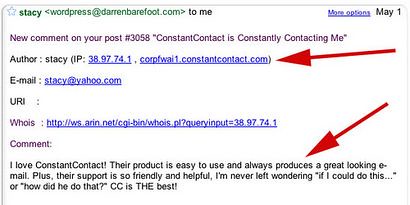Darren Barefoot pointed me to a great example of how companies should not respond to criticism in blog comments. He wrote a critical post on the email newsletter company Constant Contact and his readers pointed him to competitors in comments. Then, nearly 1 year later, this entry received 3 comments within 10 minutes, all from "people" touting their positive experiences with Constant Contact. Here's an example:

The thing is, their comments were traceable back to the company (as Darren's red arrows above illustrate). There is a clever person, sitting at a desk at Constant Contact headquarters, adding multiple fake comments to entries like Darren's.
Darren explains...
Marketing lessons? Well, they should be obvious:
- Never lie. You’re going to get caught. Constant Contact should have just left a comment explaining the advantages of their service over the competition, plans for new features, and so forth.
- Join the conversation, don’t try to spin it.
- If you’re going to lie (and you surely shouldn’t), don’t be stupid about it. Understand how the Web works, and that if you comment from your desk at Constant Contact headquarters, that you may be traceable. And I’m no l33t hax0r–the evidence is right there in my notification email from WordPress.
This reminds me of Visible Technologies, that I wrote about here . They have touted their "thousands of personas registered with online forums" that can be used to balance negative/critical discussions. Maybe Constant Contact should have teamed up with them so that their lying would not have been as traceable. A match made in heaven .
My message: When it comes to dealing with your customer "community" in a responsible and productive way, there are no shortcuts. If you try to take the easy route, you are taking a big risk because you may end up creating more negative feelings and press that you ever imagined. Be real, be honest, be a person.
Case in point, this entry. I am telling my small part of the online world that Constant Contact appears to be making pathetic and dishonest attempts to balance criticism - and proving that Darren may have made the best decision in choosing a competitor, in his case, Campaign Monitor.
Aside: I think Constant Contact's tactic is called "astroturfing", derived from the brand of artificial grass used on sports fields. Artificial grass - articificial grassroots campaigns - I think you get it. More on Wikipedia.